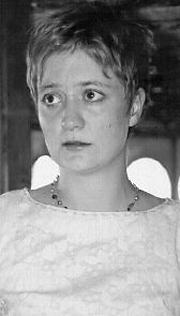ANY PRODUCTION OF a play by Anton Chekov must penetrate a sort of invisible barrier to reach its audience. Simply put, actors and theater people seem to enjoy producing Chekov more than most audiences seem to enjoy watching it. The great Russian playwright’s dedication to creating an entire cast of fully rounded characters is irresistible to performers, but it sends his plots into inevitable detours, where action and incident become secondary to the reactions of his creations to one another.
The Seagull
Kalakala Ferry, ends July 21
In no play is the “Chekov barrier” greater than in The Seagull, which is as much about artists and the theater as it is about the infinite tragic complexions of crossed love. Four of its characters—the vain and aging actress Arkadina; her overwrought playwright son Konstantin; her lover Trigorin, a writer; and Nina, a young woman who is first Konstantin’s muse then later Trigorin’s lover—are artists. The play begins with Konstantin’s frenzied preparations for his avant-garde play, an odd experimental piece written self-consciously in a “new form,” and the debate on writing and drama continues through to the final scene. While both Chekov and his characters are repeatedly consumed by these issues, it’s not always territory into which a general audience follows willingly.
Unlike Konstantin’s play, of which Nina complains “there’s no love interest,” there’s plenty of love in this story, even if almost all of it is thwarted, misdirected, or unrequited. And it’s here that Printer’s Devil’s current production of The Seagull is unmistakably successful, in a production that brings together a supremely strong ensemble of actors for a show staged in the dilapidated and delightfully rusty Kalakala ferry.
IT’S HARD to pick favorite performances from such a superlative cast, but Heidi Schreck as Nina and John Ambramson as Trigorin both stand out—Schreck for her brilliant fulfillment of a complex role and Ambramson for his original take on his character. From her first appearance, Schreck is so vital, so joyfully eager to embark on the life of an actor that she makes us believe that this is a comedy, darn it, just as Chekov himself advertised. This makes her return in the final act, when two years of personal tragedy have shattered her chrysalis, all the more devastating. (While I remain unconvinced that endurance is the final word on an artist’s life, she makes the case about as well as it could be made.) Ambramson, on the other hand, is wonderfully offhand as the successful writer, hinting that his unstoppable creativity is at a distance from his passive, and ultimately selfish, character.
Tina Kunz, as Masha, displays a wonderful sort of active sullenness that hints at a frustrated creativity. She wants Deron Bos’ Konstantin (and spurns Matt Ford’s wistful Medvedenko) as much for his intelligence as for his brooding brow, and her real mourning at the play’s end is a agonizing recognition that she is now, truly and forever, alone.
Both David Gehrman’s music and the show’s costumes share a slightly slipshod attempt to contemporize the piece. Konstantin wears a T-shirt in one scene and a frock coat in another, while Richard LeFebvre’s surly servant Yakov sports tattoos and a “Motel 6” shirt. Gehrman strums quietly on the guitar for pre-show music and intervals, but suddenly switches on an amp for no very good reason in the play’s late scenes.
These arbitrary and unconvincing choices are indicative of a deeper lack of consistent directorial vision. While Fagan’s cast shows the strengths of a well-rehearsed ensemble, several scenes—particularly in the second half—lack a drive or clear intent. For all the fine acting on display, it sometimes fails to build cumulatively; one finds oneself biding time until the next bit of strongly felt emotion. Such inconsistencies aside, this show brilliantly breaches the barrier between the complex inner lives of these characters and our own emotional understanding.








